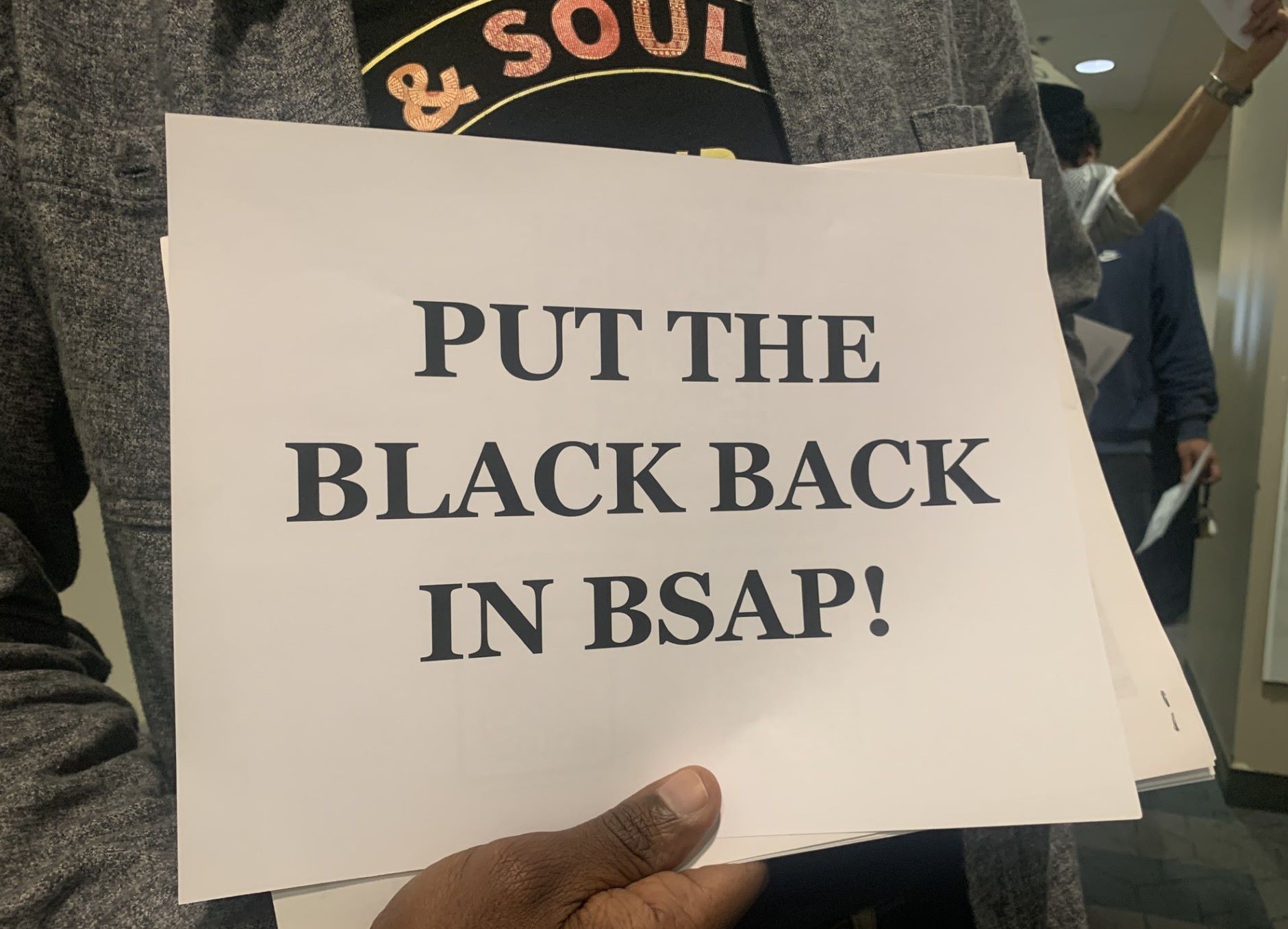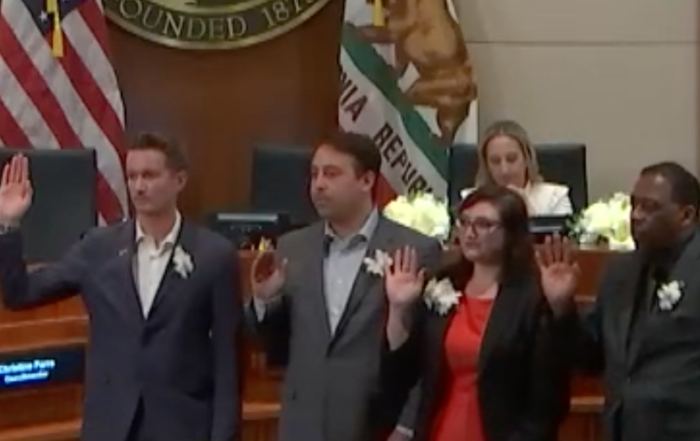Students and allies convened at Los Angeles Unified (LAUSD) headquarters on Tuesday to demand the district keep its commitments to Black students. The Black Student Achievement Plan (BSAP), a reparative initiative introduced in the district in 2021 to address historic and ongoing inequities specifically harming Black students, split a $36.5 Million budget between schools with significant populations of Black students, with the majority of funding going to those schools with high needs.
BSAP schools receive funding intended to support the academic, emotional, and social well-being of students and have access to a wide range of grants that promote student and staff engagement. These resources benefit all students attending these schools regardless of race.
BSAP was quietly revised to remove Black students from the criteria for BSAP funding eligibility in response to a complaint filed with the federal Department of Education’s Office of Civil Rights (OCR) by Parents Defending Education (PDE), a right-wing organization. It claimed the program was violating Title VI of the Civil Rights Act, which prohibits racial and ethnic discrimination in programs receiving federal funding.
Citing Title VI of the Civil Rights Act to remove the emphasis on Black students in BSAP is “legally erroneous and racist,” the Labor Community Strategy Center argued. When BSAP was first challenged by the OCR, the Center told Westside Voice that they “called on the LAUSD school board to issue a letter to the OCR defending the constitutionality of BSAP under the 14th amendment and Title VI of the 1964 Civil Rights Act.” However the district did not challenge the OCR, and according to the Center is now saying its hands are tied.
Police Free LAUSD, a broad coalition including Students Deserve, Reclaim our Schools L.A., UTLA, Community Coalition, and other groups, fought for the creation of BSAP. The Coalition is calling on L.A. Unified to “Put the ‘B’ back in BSAP” – return Black student populations as a criterion for BSAP eligibility, empower the BSAP steering committee, apologize to the Black community in LAUSD, and fully commit to BSAP by permanently funding $100 Million more to the initiative.
In response to a series of questions from Westside Voice, an LAUSD spokesperson gave a short statement including the following: “Los Angeles Unified is committed to addressing the achievement gap that has historically impacted Black students. There have been no changes to the Black Student Achievement Plan, and all district-allocated resources to BSAP remain.”
According to the OCR, “the District revised the BSAP criteria,” prompting the office to dismiss PDE’s complaint.
In 2023, school BSAP eligibility was determined by the number of Black students at each school combined with the presence of “high need flags” like above-average suspensions or chronic absenteeism and low English and math proficiency rates.
For 2024-2025, the number of Black students at a school was no longer listed as criterion for eligibility.
The list of BSAP group 1 schools, 53 schools receiving the most support through BSAP funds, has not changed since the criteria was revised. But the district has collapsed the other tiers of eligibility into one, no longer giving priority to schools that have a high number of Black students but less than two “high need flags.”
Schools in group 1 represent only 32 percent of Black students in the district. The district’s past tiering of BSAP groups had 46 percent of the district’s Black students in groups 2 and 3. In all, that ensured that 78 percent of Black students in L.A. Unified were attending schools receiving significant support from BSAP. It remains to be seen how the district will maintain the plan’s focus on Black student achievement when Black students have been written out of the criteria.
When Westside Voice asked for clarity on the district’s statement that “there have been no changes” to BSAP, a district spokesperson responded “We have no further information beyond our statement at this time. Thanks.”
However, the district communicated elsewhere that there were changes to BSAP. The L.A. Times reported the district would “overhaul” BSAP. The district confirmed to the Times that it would “end the exclusive focus on Black students and instead identify students and schools through factors other than race.”
This is precisely why Students Deserve and other allied groups have given dozens of public comments during board meetings since they learned of the change.
Three leaders from groups within the Police Free LAUSD Coalition told Westside Voice that responses from the district had been disappointing.
Ezekiel Mitchell, a senior at Crenshaw High, said the district barely listened to students who spoke at board meetings.
Micheleé Lindsey-Hamler, a parent to twins attending Hamilton High, said L.A. Unified gives “lip service” to students and parents but doesn’t follow through, even when it acknowledges that Black families are often burdened with “having to come [to the district] and beg” for things that should come easily.
Braxton Jordan, a senior at Dorsey High, has experienced the district saying one thing and doing another more than once.
Jordan argued this was part of a well-worn strategy from the district – issue vague or oddly phrased releases and shoo away students.
“They’re scared of the power that comes behind our numbers and our voices,” she said.
And their voices were heard during the board meeting on Tuesday. The boardroom was packed with students and allies. After giving public comments about BSAP for an hour, nearly the entire room stood and chanted “Put the B Back in BSAP” for a good few minutes, no small feat in a strict boardroom setting.
Part of BSAP’s success lies in the way that staff have risen to that responsibility, becoming lifelines for students who have never received that level of emotional or academic support at school.
Lindsey-Hamler said BSAP gave her children access to school counselors for the first time. “Now, they have a whole village surrounding them,” she said.
BSAP also helped one of her children, overcome his shyness. “LAUSD honed in on what my child needed versus leaving him out there and making him a problem, when he wasn’t a problem.”
Last year, BSAP funded a trip for students to visit HBCUs in Atlanta. Jordan had never really considered attending an HBCU before that trip, but now she was submitting an early application to Spelman University.
Mitchell said the HBCU trip, among other daily supports, has changed the way students think about the future. “They’re being pushed towards things that they once thought were out of their reach,” he said.
BSAP is still just beginning to redress the inequities Black students in L.A. Unified experience. On Tuesday, speakers reminded the district that its discrimination against Black students is a historical and present fact.
Joseph B., an LAUSD student, gave the audience a history lesson. “In 1972, 18 years after Brown vs. the Board of Education, L.A. Unified was found guilty of intentionally segregating city schools. In 2011, the Department of Education’s Office of Civil Rights found that LAUSD’s disproportionate discipline and failure to serve Black students deprived them of equal rights to an education.”
He added, “History does not lie, and right now you’re on the wrong side.”
Channing Martinez, a member of the district’s BSAP steering committee, called on the board to have a public hearing on the mistreatment of Black students at L.A. Unified.
“LAUSD has over the last 20 years caused irreparable harm to Black students,” Martinez said. Martinez is also the co-director of the Labor Community Strategy Center. “There is nothing in federal or state law that prohibits LAUSD from implementing a program that specifically addresses the harm that you have caused.”
Parents Defending Education, an organization based in Virginia, has filed 10 complaints with the OCR this year alone, singling out school districts across the country for having affinity groups for students of color or sending out invitations to parent meetings in Spanish.
The litigious right-wing group has mounted several campaigns over the years and appears to broadly oppose efforts to support marginalized students or improve the education that all students receive in the classroom. PDE belongs to the same ecosystem of right-wing organizations that have taken aim at LAUSD before.
PDE did not respond to a request for comment.
Jordan believes BSAP is a threat to right-wing groups because it’s working. “They’re trying to cut it off at the root,” she explained. “They can try, but we’re always going to fight back. We’re always going to come back times ten.”
Photo by the author.
Stay informed. Sign up for The Westside Voice Newsletter
By clicking submit, you agree to share your email address with Westside Voice. We do not sell or share your information with anyone.








